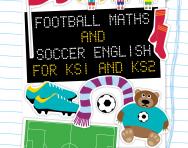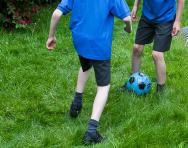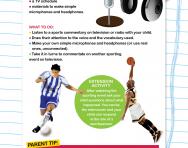10 ways football can help your child's learning

Football can dominate some kids’ lives. If they're not playing it, they're watching it, and even when the television is turned off and the football is locked away, they still talk about it.
The old adage of 'if you can't beat them, join them' comes into play here. Football is an excellent medium for teaching children, providing them with loads of reasons to learn and to enjoy learning. Ready to kick off with these ideas?
Football-inspired learning opportunities
1. Telling the time As any football fan knows, time is important, whether it’s about finding out when the game starts, or counting the minutes to half time. Discuss what time kick-off is. Look at the clock and get your child to show you where the big and little hands will be when the game begins. Talk about how many minutes are in a game, what time half time will be at, and when the game will be finished.


Start a unique learning programme!
- Weekly programme for each school year
- Worksheets sent direct to your inbox
- Keeps your child's learning on track
2. Numeracy Tickets cost money, footballers cost money, footballers make big money. Bring this into conversation when talking about football. Talk about the cost of tickets and show the child what this money looks like. Discuss how much each player costs and who the most expensive player in the team is. This will help them put numbers into context.
The Numbers Game campaign encourages children to be physically active and engage with maths at home through football-themed maths videos and free online learning materials for children aged 5-11 years from Twinkl. The Champions Challenge Cards are a series of Numbers Game maths problems for primary-school children, based on data from the UEFA Champions League and designed to be used in the classroom or at home.
3. Reading doesn't always have to be fiction; non-fiction can work better if your child is keen to glean new information about current sporting events. Read match reports in the newspapers together, and programmes at the game.
There is a wonderful selection of children's fiction books about football, as well as football themed literacy programmes like Premier League Primary Stars and the National Literacy Trust Premier League Reading Stars.
The National Literacy has also teamed up with the Premier League and Dan Freedman, author of the Jamie Johnson football novels, to offer free football-themed literacy activities, resources and challenges and a free ebook download of The Kick Off (Scholastic UK).
4. Geography Football is an international game with most big teams containing footballers from outside the UK. Take advantage of this. Find them on the map and talk about the cities and countries they are from.
5. ICT Your child probably doesn’t need a reason to go online, but exploring football websites could be a great way to get them reading. Can you find some good football blogs to visit together? Could your child post comments? It’s a great way to learn to formulate an opinion and navigate the web.
6. Writing Suggest writing football stories, or sit down and write a report of the match. Even children who are not keen on writing will pick up a pencil if they are excited about the subject. Who not write a letter to Grandpa to tell him about a recent game, for example?
The Scottish Football Association offers digital teaching resources which aim to engage children through football-based classroom projects, developed in line with Curriculum for Excellence outcomes in literacy, expressive arts, health and wellbeing, maths and numeracy, science, social studies and technologies. From football kit design to learning about famous landmarks in UEFA European Championship host cities, there are more than 40 activities to choose from.
7. Hand-eye coordination Football helps improve hand-eye coordination which is important for learning to write, and can help improve handwriting. So no excuses – make a kick-around in the park or your garden a regular part of your week-end.
8. Speaking, and confidence in public speaking, is an important skill at any age. If football is a subject your child can talk for hours about, take advantage of it. Initiate conversations about football, remembering to listen to what your child has to say so that they know their opinion matters.
9. Foreign languages Whether it is through speaking about foreign players or foreign teams, use football to discuss how to say 'hello' in Lionel Messi's native Spanish or Samir Nasri's French. If your child’s ambition is to play international football, explain how knowing a foreign language will make life easier when they’re playing abroad and dealing with all their fans!
10. Confidence is often forgotten, but children need to believe in themselves to make the best of their learning. If football helps build their self-confidence, grab the opportunity and build on it by providing praise and positive reinforcement about all aspects of their life.

Give your child a headstart
- FREE articles & expert information
- FREE resources & activities
- FREE homework help








